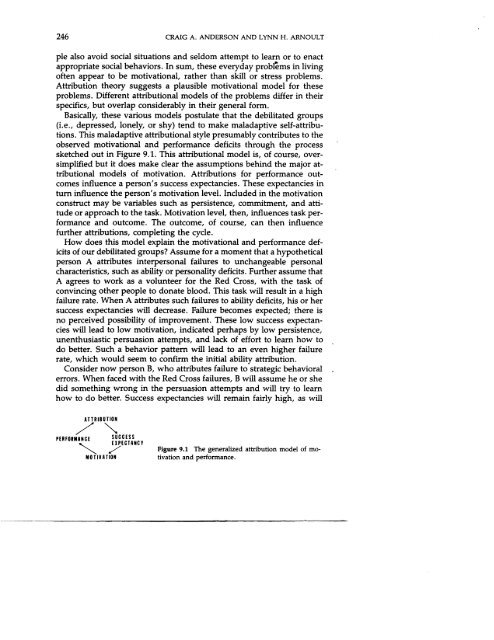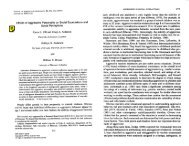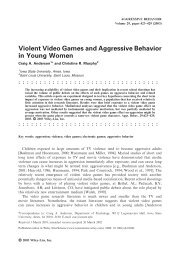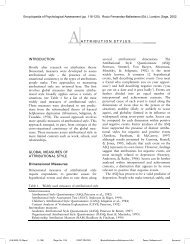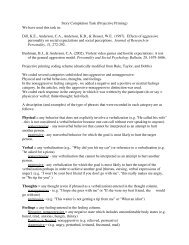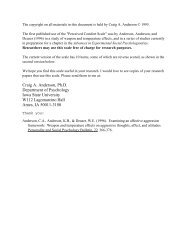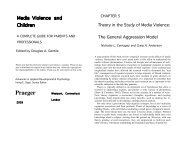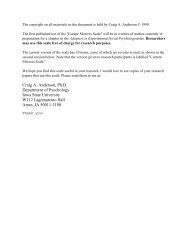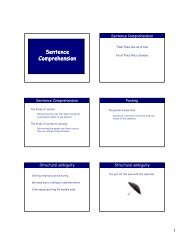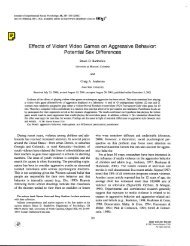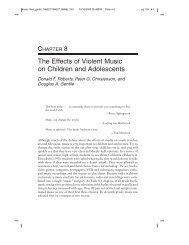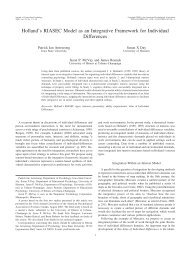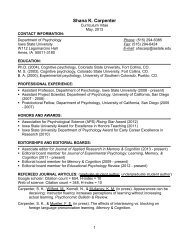Attributional Models of Depression, Loneliness, and Shyness
Attributional Models of Depression, Loneliness, and Shyness
Attributional Models of Depression, Loneliness, and Shyness
You also want an ePaper? Increase the reach of your titles
YUMPU automatically turns print PDFs into web optimized ePapers that Google loves.
246 CRAIG A. ANDERSON AND LYNN H. ARNOULT<br />
pIe also avoid social situations <strong>and</strong> seldom attempt to learn or to enact<br />
appropriate social behaviors. In sum, these everyday problems in living<br />
<strong>of</strong>ten appear to be motivational, rather than skill or stress problems.<br />
Attribution theory suggests a plausible motivational model for these<br />
problems. Different attributional models <strong>of</strong> the problems differ in their<br />
specifics, but overlap considerably in their general form.<br />
Basically, these various models postulate that the debilitated groups<br />
(i.e., depressed, lonely, or shy) tend to make maladaptive self-attributions.<br />
This maladaptive attributional style presumably contributes to the<br />
observed motivational <strong>and</strong> performance deficits through the process<br />
sketched out in Figure 9.1. This attributional model is, <strong>of</strong> course, oversimplified<br />
but it does make clear the assumptions behind the major attributional<br />
models <strong>of</strong> motivation. Attributions for performance outcomes<br />
influence a person's success expectancies. These expectancies in<br />
turn influence the person's motivation level. Included in the motivation<br />
construct may be variables such as persistence, commitment, <strong>and</strong> attitude<br />
or approach to the task. Motivation level, then, influences task performance<br />
<strong>and</strong> outcome. The outcome, <strong>of</strong> course, can then influence<br />
further attributions, completing the cycle.<br />
How does this model explain the motivational <strong>and</strong> performance deficits<br />
<strong>of</strong> our debilitated groups? Assume for a moment that a hypothetical<br />
person A attributes interpersonal failures to unchangeable personal<br />
characteristics, such as ability or personality deficits. Further assume that<br />
A agrees to work as a volunteer for the Red Cross, with the task <strong>of</strong><br />
convincing other people to donate blood. This task will result in a high<br />
failure rate. When A attributes such failures to ability deficits, his or her<br />
success expectancies will decrease. Failure becomes expected; there is<br />
no perceived possibility <strong>of</strong> improvement. These low success expectancies<br />
will lead to low motivation, indicated perhaps by low persistence,<br />
unenthusiastic persuasion attempts, <strong>and</strong> lack <strong>of</strong> effort to learn how to<br />
do better. Such a behavior pattern will lead to an even higher failure<br />
rate, which would seem to confirm the initial ability attribution.<br />
Consider now person B, who attributes failure to strategic behavioral<br />
errors. When faced with the Red Cross failures, B will assume he or she<br />
did something wrong in the persuasion attempts <strong>and</strong> will try to learn<br />
how to do better. Success expectancies will remain fairly high, as will<br />
ATTRIBUTION<br />
/"'-.<br />
PERFORMANCE<br />
SUCCESS<br />
~ ~ECTANCY<br />
MOTIVATION<br />
Figure 9.1 The generalized attribution model <strong>of</strong> motivation<br />
<strong>and</strong> performance.<br />
~<br />
'<br />
'


